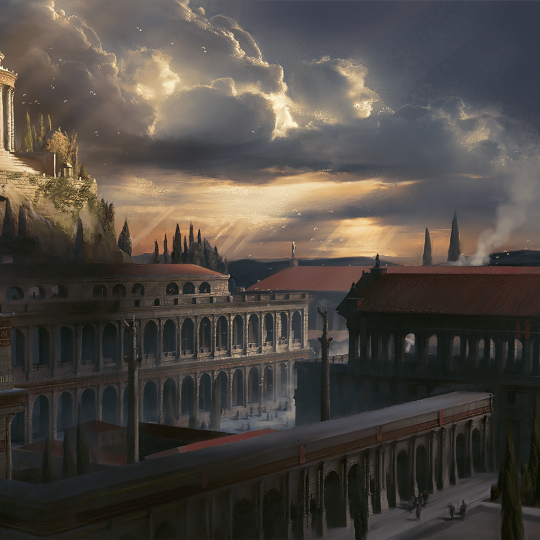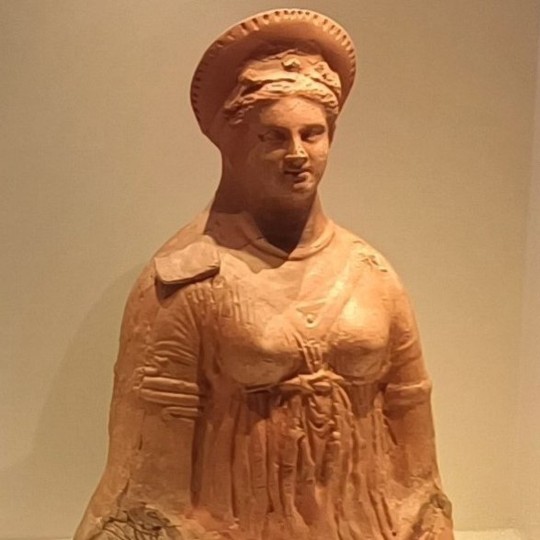#Amphictyon
Explore tagged Tumblr posts
Note
Hello Mrs Reames! Quick question as someone that is still new to Alexander the Great, I was on TikTok the other day and someone posted a TikTok of an incident in which Alexander the Great supposedly dragged the oracle of Delphi out by her hair because she couldn't give him a prophecy that day, is this true?
Alexander and the Delphic Oracle
First, before answering, let’s do a quick PSA. I’m sure the asker meant to address me in the most polite way they knew how, and I’ve run into this error frequently with undergrads, who (at least in American public schools) are told to address a female teacher as “Ms.” or “Mrs.”
Thus, I offer this correction as gently as possible. But it’s important in an era when titles are being withheld from women as a means of belittlement—then, if a woman dares to object, they’re made fun of or called uppity and “sensitive.”* Again, I’m sure the asker here did not mean anything unkind (or they wouldn’t be asking me something in the first place!). So this is NOT a slap at them. But I’m not a Mrs. (I'm not married, and Reames is my birth name). I’m Dr. Reames or Professor Reames. You can even call me Jeanne (as long as you’re not a student in my class, ha). If you’re a (US) college student and unsure if your instructor has a PhD, “professor” is always safe. 😊
Now, to the question….
Plutarch tells a rather peculiar little story of new King Alexander, on his way home from a meeting of the Corinthian League (in Corinth), stopping at Delphi to ask the oracle a question. I should add, this event occurs right after Plutarch’s description of ATG’s meeting with the Cynic philosopher Diogenes. (E.g., it’s part of a “theme.”)
Now, the Delphic oracle wasn’t open for consults all the time. She only heard them a day or so a month…and that for only some months of the year. He came at the wrong time of year (winter, when Dionysos held the oracle, not his half-brother Apollo). So she told him, “No.” Reportedly, he stormed to her little house in the village of Delphi to manhandle her, intending to drag her to the oracle for his query. She replied, “Son! You’re invincible!” Pleased with that, he let her go.
And Plutarch presents this as if it’s all a-okay.
This is weird. It’s weird that Plutarch, a priest of Delphi from Chaironeia, wasn’t up in arms about this clear affront to an honored oracle (and an old woman). It’s an act of asebia (impiety). But it would be even weirder if Alexander had actually done it. Alexander, the uber-pious.
Plutarch is the ONLY one to tell this story. Anywhere.
Yet there’s a story remarkably like it with different players set during the Third Sacred War when the Phokians had seized the Oracle. It’s this event that set off the war, and which brought ol’ Philip into southern politics and eventually landed him a seat on the Amphictyonic Council as a staunch “Defender of Apollo.” Philomelos was the leader of the Phokians early in the war. Below are both accounts, starting with Diodoros’s (original source likely Kallisthenes, who wrote a history of the war).
With the oracle in Philomelus’ hands, he instructed the Pythia to continue prophesying from the tripod in the traditional way. When she refused, he threatened her and compelled her to mount the tripod. To this display of excessive force, she responded by declaring that he could do whatever he wanted—and he was pleased by this and declared that he had the oracle that suited him. He immediately had the oracle inscribed and set up for all to see, in order to make it clear that he had the god’s permission to do whatever he wanted, and he convened an assembly at which he boosted morale in the ranks by telling them about the prophecy (Diod. 16.27.1-2, Waterfield trans).
And now, wishing to consult the god concerning the expedition against Asia, [Alexander] went to Delphi; and since he chanced to come on one of the inauspicious days, when it is not lawful to deliver oracles, in the first place he sent a summons to the prophetess. And when she refused to perform her office and cited the law in her excuse, he went up himself and tried to drag her to temple, whereupon, as if overcome by his ardour, she said: “Thou art invincible, my son!” On hearing this, Alexander said he desired no further prophecy, but had from her the oracle which he wanted (Plut. Alex. 14.4, Perrin trans.)
With Philomelos, there is no question later in Diodoros that his act was impiety. His eventual death is (partly) attributed to it. Plutarch picks up this event, dusts it off, recasts the “inquirer,” and—moreover—uses it as affirmation of Alexander’s “invincibility.” Remember “The Invincible” was his nickname in Greece in his own day. The Romans called him Magnus (the Great).
In short, Plutarch retooled the story to suit his own purposes.
So no, it never happened. At least, not with Alexander. (And he’d have been horrified, I think, to hear he’d been accused of any such thing.)
Plutarch makes these detail changes when it suits him. I have an article coming out in a year or so where I discuss this tendency and bring the receipts (of quite a few examples)—including one I think a lot of folks here will find VERY interesting. But I’m not the only one saying it about this event in particular. It’s been noted as an “odd” episode before, including by Hamilton, if I recall (who did the commentary on Plutarch). But Lara O’Sullivan really showed where it came from, source-wise, in her “Callisthenes and Alexander the Invincible God,” P. Wheatley and E. Baynham, eds., East and West in the World Empire of Alexander: Essays in Honour of Brian Bosworth. Oxford: Oxford Univ. Press (2015), 35–52.
Some may still wonder why Alexander wouldn’t have gone to the oracle?
He didn’t need to. His father already had. And if later historians (such as Diodoros) reinterpreted her pronouncement to be about Philip’s murder, not the fall of Persia, it was a positive reply at the time. Going to Delphi again might risk something less flattering/hopeful. Not to mention, it was the wrong time of the year, and Alexander knew that. He had more important fish to fry. He wasn’t going to hang around, waiting (for months) for an auspicious day.
He was good with the oracle his father had got. After all, he’d been trumpeting for months that “only the name of the king had changed.” The original oracle would do just fine.
------------------------
*A BIG stink was made here in the US by the conservative media over Dr. Jill Biden being “Dr.” The initial "rebuke" stemmed from the fact her degree is “just” a doctor of education. When that faced pushback, however, conservatives on social media began to fuss, well, she wasn’t a MEDICAL doctor, so didn’t “deserve” that title. Which is silly. Doctor is the correct title for a medical doctor, as well as for a host of professional degrees, including a doctor of education, a doctor of theology, a doctor of business, etc. The degree that takes the longest to complete is the PhD, or doctor of philosophy. We’re ALL “doctors.” The problem for them was a professional woman who dared to use her title. Wasn’t she an uppity bitch?
#Alexander the Great#asks#Delphic Oracle#Alexander and Delphi#The Third Sacred War#Classics#Plutarch lies#Diodoros#Philomelos#ancient Greece#asebia#impiety in Greek religion#ancient Macedonia#tagamemnon
22 notes
·
View notes
Photo

Amphictyonic League
The Amphictyonic League was an early form of religious council in ancient Greece. It was typically composed of delegates from several tribes or ethnes living in the vicinity of a major, prosperous sanctuary, who then collaborated in supervising the temple's maintenance, managing its finances, organising the sacred rituals and games, and seeing to the protection of its temenos (sacred precinct).
The earliest evidence about the existence of such executive assemblies appears in the 7th century BCE, and the most significant and best-documented examples are the Amphictyonic Leagues of Delos and Delphi, both presiding the sanctuaries of Apollo, his Pythian Oracles, and the Pythian Games.
While the Amphictyonic League was primarily a religious organization, it sometimes played a significant role in the political and military affairs of ancient Greece. The League's most notable involvement in Greek warfare occurred during a series of conflicts known as the Sacred Wars over control of the Delphic sanctuary. These conflicts had a dramatic impact on the course of Greek history and the development of the poleis (city-states), fostering changes that eventually cushioned the ambitious plans of Philip II of Macedon (r. 359-336 BCE), and his son Alexander the Great (r. 336-323 BCE), for conquering the Hellenic world.
Origins & Structure
The exact origins of the Amphictyonic League are wrapped in myths and legends, but it is generally agreed that, by the 7th century BCE, the gathering of a council of tribal representatives to look after their local sanctuary was a practice already recognised in Archaic Greece (c. 800-480 BCE). According to Herodotus (8.104) and Pindar (Pythian Odes, 4.66, 10.8), the Greek word amphictiones (άμφικτίονες) means "those who dwell around," implying the solidarity among neighbouring tribes through their connection with and their care for a pivotal sacred place.
In Greek mythology, Amphictyon, the legendary founder of the league, was a son of Deucalion and Pyrrha, the surviving couple of the Great Flood in the Greek version of the story, and the younger brother of Hellen, whose name became the overall denomination of the Greek people as Hellenes (Graecus, the eponym of the Graecians as the Romans called the Greeks, was the son of Zeus and Pandora). Following the flood, Amphictyon with his family took refuge in Athens, where he became the son-in-law and later the successor of King Cranaus. Amphictyon then became king of Thermopylae near Phthiotis in Thessaly, where his brother Hellen was the ruler. Since Cranaus, Deucalion, and many other legendary Greek founder-rulers were believed to be chthonic, born of Mother Earth, the earliest Amphictyonic council was then formed to protect and provide for the sanctuary of Demeter Amphictyonis in Anthela, Thermopylae, since Demeter was the goddess of the underworld in her older cults.
Based on this inherent connection to the underworld, members of the Amphictyonic council (pylaia) were known as the pylagorai, guardians of the gate to the underworld. A second, and superior, group of the delegates were the hieromnemones, sacred recorders, who had the power to finalise the debated decisions by casting votes (Aristotle, Politics 8.6). The pylaia met twice a year, once in spring at Delphi and once in autumn at Anthela. Their agenda, essentially, covered the matters considering the maintenance and protection of the sanctuary, which typically consisted of a central temple (and often some related side temples, shrines, and altars), the temenos, and the treasury. Organising and supervising the sacred rituals held at the sanctuary, including public games and competitions, was another important task of the Amphictyonic Council.
Amphictionic Law of Delphi
Jastrow (CC BY-NC-SA)
Although presumed more or less ubiquitous, there are only a few Amphictyonies known to us apart from the ones at Delos and Delphi: the Amphictyony of Onchestos near Thebes in Boeotia dedicated to the temple of Poseidon, the Amphictyony of Amarynthos in Euboea tending the sanctuary of Artemis, and the Amphictyony of Kalauria, an island near the coast of Troezen. The latter, also related to the cult of Poseidon, was claimed by Strabo (8.6.14) to be one of the earliest in the Archaic times – functioning at least until the end of the 4th century BCE – and archaeological evidence accordingly places its foundation between c. 680 and 650 BCE. On the other hand, an alternative legend accounts for the unification of the guardian councils of the Demeter Amphictyonis and the Apollonion at Delphi as the Great Amphictyonic League in the aftermath of the Trojan War, c. 1200 BCE. Historically, however, the great Amphictyonic League at Delphi was founded no earlier than c. 590 BCE. It is the best-documented council of its kind and has the longest remaining history, not least because of its pivotal role in the Sacred Wars.
Continue reading...
43 notes
·
View notes
Text


[Title] PANAMA DECLARATION ON POPULAR SOVEREIGNTY AND THE PRESIDENT-ELECT OF VENEZUELA, EDMUNDO GONZÁLEZ URRUTIA The former heads of State and Government who formed the Democratic Initiative of Spain and the Americas (IDEA Group), Given that we are approaching the bicentennial year of the Amphictyonic Congress convened by Simón Bolívar, on the Isthmus of Panama; Bearing in mind that on July 28th 2024, after the presidential elections in Venezuela have been held, as shown by the authentic voting records kept by the democratic opposition and verified by international technical institutions, Edmundo González Urrutia is the president-elect of Venezuela; Being expected for the president-elect to assume his presidential mandate for the constitutional six-year term that begins on January 10 2025, for which he would have the support of former presidents; Considering that the Venezuelan people, in a decisive manner and in an unprecedented majority, have decided on a change of political course and their desire to grow in freedom, following the sovereign mandate that has been dictated and that all the powers of the State are obliged to obey, especially the National Armed Forces, and that the international community of democracies must support it; We salute all Venezuelans, civilians or in uniform, and invite them to honor their national tricolor, to respect without reservation the Constitution and the sacred popular sovereignty that resides in them and from which all the organs of the State emanate; and, to this end, disavow, as ordered by the Constitution, any regime, law or authority that contradicts democratic values, principles and guarantees or undermines human rights. January 8, 2025
8 notes
·
View notes
Text
The Horizon Which One Beholds From the Summit of a Barricade
The situation of all in that fatal hour and that pitiless place, had as result and culminating point Enjolras’ supreme melancholy.
Enjolras bore within him the plenitude of the revolution; he was incomplete, however, so far as the absolute can be so; he had too much of Saint-Just about him, and not enough of Anacharsis Cloots; still, his mind, in the society of the Friends of the A B C, had ended by undergoing a certain polarization from Combeferre’s ideas; for some time past, he had been gradually emerging from the narrow form of dogma, and had allowed himself to incline to the broadening influence of progress, and he had come to accept, as a definitive and magnificent evolution, the transformation of the great French Republic, into the immense human republic. As far as the immediate means were concerned, a violent situation being given, he wished to be violent; on that point, he never varied; and he remained of that epic and redoubtable school which is summed up in the words: “EightyNinety-three.”
Enjolras was standing erect on the staircase of paving-stones, one elbow resting on the stock of his gun. He was engaged in thought; he quivered, as at the passage of prophetic breaths; places where death is have these effects of tripods. A sort of stifled fire darted from his eyes, which were filled with an inward look. All at once he threw back his head, his blond locks fell back like those of an angel on the sombre quadriga made of stars, they were like the mane of a startled lion in the flaming of an halo, and Enjolras cried:

“Citizens, do you picture the future to yourselves? The streets of cities inundated with light, green branches on the thresholds, nations sisters, men just, old men blessing children, the past loving the present, thinkers entirely at liberty, believers on terms of full equality, for religion heaven, God the direct priest, human conscience become an altar, no more hatreds, the fraternity of the workshop and the school, for sole penalty and recompense fame, work for all, right for all, peace over all, no more bloodshed, no more wars, happy mothers!

To conquer matter is the first step; to realize the ideal is the second. Reflect on what progress has already accomplished. Formerly, the first human races beheld with terror the hydra pass before their eyes, breathing on the waters, the dragon which vomited flame, the griffin who was the monster of the air, and who flew with the wings of an eagle and the talons of a tiger; fearful beasts which were above man. Man, nevertheless, spread his snares, consecrated by intelligence, and finally conquered these monsters. We have vanquished the hydra, and it is called the locomotive; we are on the point of vanquishing the griffin, we already grasp it, and it is called the balloon. On the day when this Promethean task shall be accomplished, and when man shall have definitely harnessed to his will the triple Chimæra of antiquity, the hydra, the dragon and the griffin, he will be the master of water, fire, and of air, and he will be for the rest of animated creation that which the ancient gods formerly were to him. Courage, and onward! Citizens, whither are we going? To science made government, to the force of things become the sole public force, to the natural law, having in itself its sanction and its penalty and promulgating itself by evidence, to a dawn of truth corresponding to a dawn of day. We are advancing to the union of peoples; we are advancing to the unity of man. No more fictions; no more parasites. The real governed by the true, that is the goal.

Civilization will hold its assizes at the summit of Europe, and, later on, at the centre of continents, in a grand parliament of the intelligence. Something similar has already been seen. The amphictyons had two sittings a year, one at Delphos the seat of the gods, the other at Thermopylæ, the place of heroes. Europe will have her amphictyons; the globe will have its amphictyons. France bears this sublime future in her breast. This is the gestation of the nineteenth century. That which Greece sketched out is worthy of being finished by France.

Listen to me, you, Feuilly, valiant artisan, man of the people. I revere you. Yes, you clearly behold the future, yes, you are right. You had neither father nor mother, Feuilly; you adopted humanity for your mother and right for your father. You are about to die, that is to say to triumph, here. Citizens, whatever happens to-day, through our defeat as well as through our victory, it is a revolution that we are about to create. As conflagrations light up a whole city, so revolutions illuminate the whole human race. And what is the revolution that we shall cause? I have just told you, the Revolution of the True.

From a political point of view, there is but a single principle; the sovereignty of man over himself. This sovereignty of myself over myself is called Liberty. Where two or three of these sovereignties are combined, the state begins. But in that association there is no abdication. Each sovereignty concedes a certain quantity of itself, for the purpose of forming the common right. This quantity is the same for all of us. This identity of concession which each makes to all, is called Equality. Common right is nothing else than the protection of all beaming on the right of each. This protection of all over each is called Fraternity. The point of intersection of all these assembled sovereignties is called society. This intersection being a junction, this point is a knot. Hence what is called the social bond. Some say social contract; which is the same thing, the word contract being etymologically formed with the idea of a bond. Let us come to an understanding about equality; for, if liberty is the summit, equality is the base. Equality, citizens, is not wholly a surface vegetation, a society of great blades of grass and tiny oaks; a proximity of jealousies which render each other null and void; legally speaking, it is all aptitudes possessed of the same opportunity; politically, it is all votes possessed of the same weight; religiously, it is all consciences possessed of the same right.

Equality has an organ: gratuitous and obligatory instruction. The right to the alphabet, that is where the beginning must be made. The primary school imposed on all, the secondary school offered to all, that is the law. From an identical school, an identical society will spring. Yes, instruction! light! light! everything comes from light, and to it everything returns. Citizens, the nineteenth century is great, but the twentieth century will be happy.

Then, there will be nothing more like the history of old, we shall no longer, as to-day, have to fear a conquest, an invasion, a usurpation, a rivalry of nations, arms in hand, an interruption of civilization depending on a marriage of kings, on a birth in hereditary tyrannies, a partition of peoples by a congress, a dismemberment because of the failure of a dynasty, a combat of two religions meeting face to face, like two bucks in the dark, on the bridge of the infinite; we shall no longer have to fear famine, farming out, prostitution arising from distress, misery from the failure of work and the scaffold and the sword, and battles and the ruffianism of chance in the forest of events. One might almost say: There will be no more events. We shall be happy. The human race will accomplish its law, as the terrestrial globe accomplishes its law; harmony will be re-established between the soul and the star; the soul will gravitate around the truth, as the planet around the light.

Friends, the present hour in which I am addressing you, is a gloomy hour; but these are terrible purchases of the future. A revolution is a toll. Oh! the human race will be delivered, raised up, consoled! We affirm it on this barrier. Whence should proceed that cry of love, if not from the heights of sacrifice? Oh my brothers, this is the point of junction, of those who think and of those who suffer; this barricade is not made of paving-stones, nor of joists, nor of bits of iron; it is made of two heaps, a heap of ideas, and a heap of woes. Here misery meets the ideal.

The day embraces the night, and says to it: ‘I am about to die, and thou shalt be born again with me.’ From the embrace of all desolations faith leaps forth. Sufferings bring hither their agony and ideas their immortality. This agony and this immortality are about to join and constitute our death. Brothers, he who dies here dies in the radiance of the future, and we are entering a tomb all flooded with the dawn.”

Enjolras paused rather than became silent; his lips continued to move silently, as though he were talking to himself, which caused them all to gaze attentively at him, in the endeavor to hear more. There was no applause; but they whispered together for a long time. Speech being a breath, the rustling of intelligences resembles the rustling of leaves.
21 notes
·
View notes
Note
Did Selene rape Endymion in his sleep?
I've seen people claiming that she was just watching him as he was sleeping, and that even though this would be considered "creepy behaviour" that's just a metaphor for why there is no moon on the night sky sometimes, therefore it's not a big deal.
Not sure. Endymion is one of those figures that are mentioned in lots of sources, several that aren't easily accessible, with many variations (ex: in the Dionysiaca he is called sleepless and never-sleeping) so it's hard to give a straightforward answer. I do think it is at the very least heavily implied in the various accounts that Selene does more than watch, since she actually joins Endymion in the cave where he is sleeping instead of simply watching him from the sky.
Still, I guess it's up to interpretation to some extent? In any case, as far as I know the only source that mentions their 50 children is one that doesn't use the sleeping Endymion motif: "The Moon, they say, fell in love with this Endymion and bore him fifty daughters. Others with greater probability say that Endymion took a wife Asterodia—others say she was Cromia, the daughter of Itonus, the son of Amphictyon; others again, Hyperippe, the daughter of Arcas—but all agree that Endymion begat Paeon, Epeius, Aetolus, and also a daughter Eurycyda. Endymion set his sons to run a race at Olympia for the throne; Epeius won, and obtained the kingdom, and his subjects were then named Epeans for the first time. … As to the death of Endymion, the people of Heracleia near Miletus do not agree with the Eleans for while the Eleans show a tomb of Endymion, the folk of Heracleia say that he retired to Mount Latmus and give him honor, there being a shrine of Endymion on Latmus." (Pausanias, Description of Greece 5.1.4-5)
Narkissos is sometimes a son of Selene and Endymion too, so there's also that, but the only source for this parentage that I know about is the Dionysiaca which, as I already said, seems to say that Endymion is not asleep when Selene visits him.
In short, I can't really say. Here is an excerpt from Timothy Gantz's Early Greek Myth on this subject, though.
12 notes
·
View notes
Text
Learning Epithets 2 - Demeter Amphictyonis

Hello all! I’m back again with another epithet. This time, we are learning Demeter Amphictyonis. As always, feel free to skip the first part and go straight to the epithet meaning if you don’t want to read how I studied and found the answers!
As listed on Theoi.com, Demeter Amphictyonis is described as:
derived from Anthela, where she was worshipped under this name, because it was the place of meeting for the amphictyons of Thermopylae, and because sacrifices were offered to her at the opening of every meeting
The Research:
As usual, I did not know any of the names, so I did some digging. I knew Thermopylae and Anthela were places, so I started there.
Anthela was a city state located in Thessaly (Thessalia). Thessaly is a region of Greece, located below Macedonia, next to Epirus, and above Central Greece, with the Aegean Sea to the east. Mount Olympus is actually located in Thessaly! The hero Jason is also from Thessaly, and him and the Argonauts started their search for the Golden Fleece by leaving off the Magnesia Peninsula. And if you know any history, you’ll know the Persians invaded Greece, and they invaded Thessaly in 480 BC.
Thermopylae is another city that is very important to history. This is, of course, where the Battle of Thermopylae took place between the Greeks (namely Spartans, Thebans, and Thesbians) and the Persians. Thermopylae is also known for their hot springs, of which it was named, and the hot gates are considered an entrance into Hades.
Okay, so we familiarized ourselves with some of the places, but what are amphictyons? An amphictyony is a group of tribes that formed a religious, cultural, and political center. There were several leagues, but the one we will be discussing is the Great Amphictyonic League or the Delphic Amphictyony.
The Delphic Amphictyony were made up of the Aenianes/Oetaeans, the Boeotians, the Dolopes, the Dorians, the Ionians, the Phthian Achaeans, the Locrians, the Magnesians, the Malians, the Perrhaebians, the Phocians, the Pythians of Delphi, and the Thessalians. Formed after the Trojan war by Amphictyon, the League was tasked with protecting the Temple of Apollo in Delphi and the Temple of Demeter in Anthela. This league was the military defender of the cult of Delphi.
The league became super politically important. They had the power to protect its temples through punishment, including fines and even banishment, to actually starting wars. There were a set of rules about war, including not cutting off water or completely abolishing any member. Fighting over dominance of the temples was allowed though. They also organized religious festivals and the Pythian Games, celebrated in honor of Apollo at Delphi.
The league participated in a series of wars called the Sacred Wars. The First Sacred War last from 595 to 585, and was fought between the Amphictyonic League and the city of Kirrha. Kirrha was the harbor of Delphi that had been mistreating people going to and coming from Delphi. The city was defeated by the Amphictyonic League and the plains were dedicated to Apollo, Leto, and Artemis. This also marked the start of the first Pythian Games.
The Second Sacred War was between the Spartans and Athenian-backed Phocians around 440 BC. The Spartans defeated the Phocians and restored self-government at Delphi.
The Third Sacred War started in 356 BC, when the Phocians seized the Temple of Apollo in Delphi. In 346 BC, the Phocians lost the war and were cast out of the League, their votes being given to Macedonia, and resulting in the domination of Macedonia over Greece after the Fourth Sacred War.
Myth proclaims the founder of the league to be Amphictyon, who was King of Thermopylae and later ruled over Athens. He is stated to be the brother or son of Hellen, the common ancestor of all Greeks.
Well-known members include Plutarch, who worked as a manager and oversaw the Pythian Games from 107 to 127 and also served as a priest for Apollo at the Temple of Delphi. Another is Aeschines, which I encourage you all to research because his story is INSANE, but he served as an Athenian deputy.
Though the league has no official end date, it is considered over around the 2nd century, under Roman rule. It was replaced by the Panhellenion, a religious league of city states set up by Emperor Hadrian to recreate Ancient Greece when it was fighting the Persians. Hadrian was a philhellene, which meant he was fond of Greek culture and history.
The Epithet:
The Temple of Demeter Amphictyonis was an extra-urban (located far away from big city populations) sanctuary in Anthela, Thessaly and served as the center for the Amphictynoic League, where they met each spring. As Herodotus says:
“Further to the south, another river, called the Phoenix, which has no great body of water, flows from the same hills, and falls into the Asopus. Here is the narrowest place of all; for in this part there is only a causeway wide enough for a single carriage. From the river Phoenix to Thermopylae is a distance of fifteen furlongs; and in this space is situate the village called Anthela, which the river Asopus passes ere it reaches the sea. The space about Anthela is of some width, and contains a temple of Amphictyonian Demeter, as well as the seats of the Amphictyonic deputies, and a temple of Amphictyon himself.” Herodotus, Histories 7. 200
As we can see, this was an extremely important cult center to the Greeks! The Amphictyonic League had a lot of political and religious power. The league made sacrifices to Lady Demeter at the start of meetings, although I have not yet been able to find what kind (even trying to research on the databases allowed to me through college has not found any sources). If anybody could point me in the direction of more information, I will be so glad to update this and credit you!
That being said, what we do know is that Demeter Amphictyonis is a goddess of wine and friendship between nations. She had her likeness printed on a silver stater with a veil and wreath of grain, and Apollo was depicted on the reverse side, inscribed with the word AMΦΙΚΤΥΩΝΩΝ (of the Amphictyons).
Unfortunately, the temple has since been destroyed. It is believed to have no longer been in use around 4th century AD because of the persecution of pagans by Christians. What remains is being studied by archaeologists.
How to Worship:
How you can worship this epithet is similar to the first one in this series - if you’re in the region, want to pay homage to the region/history, or however you want to use the epithet in your practice. Personally, seeing as it is a very important epithet relating to a very politically powerful temple, I think it is an epithet that isn’t to be used lightly. On the other hand, Demeter Amphictyonis is a goddess of wine and merriment, so if you’re having an important event or really need to rock a dinner interview, you could ask her for help.
I think a great take away from this epithet lesson is that there is so much we just don’t really know about ancient history. So much information here is not available either because a) it is not available for free or b) it’s just not researched enough. I would make assumptions, but it is dangerous to do that when I’m not a qualified historian, and I don’t want to spread misinformation like that, so I only reported on what I do know from multiple sources.
Another take away is that there is so much to learn about Ancient Greece. Even just researching this, I learned so much more about history that I want to continue to explore! The betrayal of the Phocians? The Battle of Thermopylae? Even just researching this epithet has really shown me how little I actually know and how much is still waiting for me to see and understand.
If you guys would like me to do a series on Greek history, let me know! There is a TON of related history of the amphictyonic league, so I am more than happy to explore that with you! For now, please look forward to the next epithet for Lady Demeter!
SOURCES
The Histories - Herodotus
The Phocian Betrayal at Thermopylae
Wikipedia: Aeschines
Wikipedia: Amphictyonic league
Wikipedia: Amphictyonis
Wikipedia: Ancient Thessaly
Wikipedia: Anthela (Thessaly)
Wikipedia: Mount Olympus
Wikipedia: Plutarch
Wikipedia: Temple of Demeter Amphictyonis
Wikipedia: Thessaly
Wikipedia: Thermopylae
Wikipedia: Third Sacred War
#demeter#pagan#demeter worship#hellenism#pagan help#hellenic pagan#hellenic gods#hellenic polytheism#hellenic polythiest#demeter amphictyonis#epithets#history#greek goddesses#greek gods#paganblr#paganism
5 notes
·
View notes
Text

G - Gunshot wound
"Are you sure we have everything?" TK asked and pulled his cell phone out of his pocket to glance at the list of things they had to buy.
"I've looked at it four times. We have everything it takes to make the best birthday for your dad."
TK leaned against the wall as they waited for the elevator to arrive so they could finally get to the car. They had so much to prepare so many things at home for the party that he was getting nervous.
"This is the first time we're having a party at home. It has to be perfect."
Carlos stepped in front of him and rested both hands on his shoulders. He smiled, that gesture that took all the trouble out of TK's head. He reached over and kissed him.
"We've had the engagement party at home and we hang out with the team every weekend." "It's not the same. This party my dad will come to, of course, but yours too and the whole team. I've never been the amphictyonic of an important event."
"Then you have nothing to worry about, We bought everything and you had me write down the recipes in three different places in case I forgot and lost them. Something tells me you have a better handle on this than I do."
"Yeah well but..."
A loud clatter sounded all around them. They turned around and saw a bunch of people running and screaming. They looked at each other, they couldn't be unlucky enough to be caught in an emergency on their day off.
Then they heard what neither of them had any doubt were gunshots.
"What's going on?" TK asked nervously.
"I don't know, but we're not staying here to check it out. We go down to the parking lot run to the car and in the meantime call 911 for help."
"Sounds like a good idea to me."
"Hey you guys! Where do you think you're going?"
The two turned around again, as the elevator doors opened behind them. They saw three men, none of them occupied the gun in their hands. Two pointed at them and Carlos grabbed TK by the arm. He pulled him into the elevator.
He knew what was about to happen, he didn't need to be poilcía to know that these men were either robbing or hijacking the mall. Either option could be just as bad for them.
"Freeze!"
They were shot at, Carlos did what his instinct told him, he stepped in front of TK at the sound of gunshots and pushed him into the elevator, against one of the walls and stood there until the doors closed.
"I hope there's reception down here to call 911." Carlos said with the cell phone in his hand. "Who would those people be, what would they want? It doesn't matter, the sooner the police know, the sooner we can stop them from hurting anyone. I hope no one gets hurt already."
"Carlos."
"Don't worry, that's the good thing about being with a cop. I haven't been in many kidnappings but I've studied them and..."
"Carlos." TK said again.
Before the cop turned around, the elevator went dark and stopped dead in its tracks.
Carlos braced his hands on the two walls, but had to catch TK's body as he realized he was falling forward.
"Ty, look out. are you okay?"
TK grunted. "When did you say that thing about not knowing if those people had hurt anyone." He grunted again and let himself fall even further onto Carlos, sure he'd be held up.
He put a hand to his right thigh and it was immediately smeared with blood.
"TK!"
"Some wounded if any."
#Tarlos#911 Lone Star#Road1985#Tarlos-Spain#TK Strand#Carlos Reyes#Hurt TK#Wounded TK#Gunshot#worried Carlos
1 note
·
View note
Text
And the Romans loved the Greeks. They tried to emulate them. Well...they eventually did.
1 note
·
View note
Text
Beberapa tempat bernama Kadesh: KADESH (Heb. קָדֵשׁ), name of several places in Ereẓ Israel and Syria to which a sacred character is attributed.
(1) Kadesh, Kadesh-Barnea (Heb. קָדֵשׁ, קָדֵשׁ בַּרְנֵעַ), an important oasis situated on the southern border of Canaan (Num. 34:4; Josh. 15:3; Ezek. 47:19; 48:28) in the wilderness of Zin (Num. 20:1; 27:14; 33:36; Deut. 32:51) – part of the wilderness of Paran (Num. 20:16) – at a distance of an eleven days' journey from Mt. Horeb (Deut. 1:2). Kadesh is alternatively called En-Mishpat ("spring of judgment"; Gen. 14:7) and the "waters of Meribah" ("strife," Num. 20:13, 24; 27:14; Deut. 32:51), names which indicate its special role as a sacred place of judgment and assembly for the desert tribes.
Kadesh-Barnea appears in the stories of Abraham (Gen. 16:14; 20:1) and in the description of the expedition of Chedorlaomer and his allies; Kadesh-Barnea, here called En-Mishpat, is said to have been inhabited by Amalekites (Gen. 14:7). During the Exodus it served as an assembly point for the Israelite tribes in the desert (Deut. 1:46). Some scholars regard it as the first amphictyonic center of the Israelites.
From Kadesh-Barnea spies were sent to explore Canaan (Num. 13:26); the attempt was made to penetrate into Canaan which was prevented by Arad and Hormah (Num. 14:40–45; 21:1; 33:36–40); messengers were sent to the king of Edom; and from here the Israelites started out on their eastward march to Transjordan (Num. 20:14ff.; 33:36ff.; Deut. 1:46ff.; Judg. 11:16ff.).
Biblical tradition associates Kadesh-Barnea with the family of Moses in particular: here Moses drew water abundantly from the rock; here he and Aaron were punished for their lack of faith by being denied entrance into the land of Canaan (Num. 20:2ff.); here his sister Miriam died and was buried (Num. 20:1); and Aaron died nearby at mount Hor (Num. 20:22–29; 33:37–39). Kadesh-Barnea has been identified with the group of springs 46 mi. (75 km.) south of Beer-Sheba and 15 mi. (25 km.) south of Niẓẓanah.
The name is preserved at the southernmost spring ʿAyn Qudays, but ʿAyn al-Qudayrāt to the north of it is of much greater importance being a rich spring which waters a fertile plain. In its vicinity a large fortress from the time of the Judahite kings was discovered. Most scholars therefore identify Kadesh-Barnea with the larger spring; the entire group of springs may have originally been called Kadesh-Barnea and the name survived at the southern one despite its lesser importance. During the Sinai campaign a large Israelite fortress was discovered also above ʿAyn Qudays as well as numerous remains in the whole region from the Middle Bronze I (c. 2000 B.C.E.) and Israelite periods.
0 notes
Text
雅典系列之三:国王和三个公主
回「希腊罗马神话」 在 上一回 里,我们讲到了雅典的第��任国王,安菲克特翁(Amphictyon)。其实主要是讲他父母和大洪水的故事,国王本人并不那么出彩。 到了第四任和第六任国王,主人公的名字和故事情节都有些混乱。因为这里有两个国王的名字是一样的,各自又都和三个公主有关。也就是说,我们会有两个叫 Erechtheus 的主角,和两段不同的 Erechtheus 和三个公主的故事(笔者私下认为,是因为这段历史传说过于久远,雅典人口耳相传把一些情节记串了)。 雅典人自称为 Erechtheidai,也就是“Erechtheus的后代“的意思,就像我们有时说自己是”炎黄子孙“,可见这(两)个国王在雅典文化历史中的重要性。 在 火神的故事…

View On WordPress
1 note
·
View note
Text









Goddess Moodboard: Amphictyonis 🍇
Amphictyonis in Greek mythology is a goddess of wine and friendship between nations, a local form of Demeter. Demeter was worshiped under this name at Anthela, because it was a meeting place for the amphictyons of Thermopylae, who offered sacrifices to her at the start of every meeting.
402 notes
·
View notes
Text
In Greek mythology, King Erichthonius (/ərɪkˈθoʊniəs/; Ancient Greek: Ἐριχθόνιος, romanized: Erikhthónios) was a legendary early ruler of ancient Athens. According to some myths, he was autochthonous (born of the soil, or Earth) and adopted or raised by the goddess Athena. Early Greek texts do not distinguish between him and Erechtheus,[1] his grandson, but by the fourth century BC, during Classical times, they are distinct figures.
Birth of Erichthonius: Athena receives the baby Erichthonius from the hands of the earth mother Gaia, Attic red-figure stamnos, 470–460 BC, Staatliche Antikensammlungen (Inv. 2413)
Etymology
Erichthonius of uncertain etymology is possibly related to a pre-Greek form *Erektyeu-. The connection of Ἐριχθόνιος with ἐρέχθω, "shake" is a late folk-etymology; other folk-etymologies include ἔριον, erion, "wool" or eris, "strife"+ χθών chthôn or chthonos, "earth".[a][3]
MythologyEdit
BirthEdit

Athena Scorning the Advances of Hephaestus, Paris Bordone, between c. 1555~1560
According to the Bibliotheca, Athena visited the smith-god Hephaestus to request some weapons, but Hephaestus was so overcome by desire that he tried to seduce her in his workshop. Determined to maintain her virginity, Athena fled, pursued by Hephaestus. He caught Athena and tried to rape her, but she fought him off. During the struggle, his semen fell on her thigh, and Athena, in disgust, wiped it away with a scrap of wool (ἔριον, erion) and flung it to the earth (χθών, chthôn). As she fled, Erichthonius was born from the semen that fell to the earth. Athena, wishing to raise the child in secret, placed him in a small box and then made sure no one would ever find out by giving him away.[4]
Athena gave the box to the three daughters (Herse, Aglaurus and Pandrosus) of Cecrops, the king of Athens, and warned them never to look inside. Pandrosus obeyed, but Herse and Aglaurus were overcome with curiosity and opened the box, which contained the infant and future-king, Erichthonius ("troubles born from the earth," following another etymology). (Sources are unclear regarding how many sisters participated.) The sisters were terrified by what they saw in the box: Either a snake coiled around an infant, or an infant that was half-human and half-serpent. They went insane and threw themselves off the Acropolis. Other accounts state that they were killed by the snake.
An alternative version of the story is that Athena left the box with the daughters of Cecrops while she went to fetch a limestone mountain from the Pallene peninsula to use in the Acropolis. While she was away, Aglaurus and Herse opened the box. A crow saw them open the box, and flew away to tell Athena, who fell into a rage and dropped the mountain she was carrying (now Mt. Lykabettos). As in the first version, Herse and Aglaurus went insane and threw themselves to their deaths off a cliff.
ReignEdit
When he grew up, Erichthonius drove out Amphictyon, who had usurped the throne from Cranaus twelve years earlier, and became king of Athens. He married Praxithea, a naiad, with whom he had a son, Pandion I. During this time, Athena frequently protected him. He founded the Panathenaic Festival in the honor of Athena, and set up a wooden statue of her on the Acropolis. According to the Parian Chronicle, he taught his people to yoke horses and use them to pull chariots, to smelt silver, and to till the earth with a plough.
It was said that Erichthonius was lame of his feet and that he consequently invented the quadriga, or four-horse chariot, to get around more easily. He is said to have competed often as a chariot driver in games. Zeus was said to have been so impressed with his skill that he raised him to the heavens to become the constellation of the Charioteer (Auriga) after his death.
The snake is his symbol, and he is represented in the statue of Athena in the Parthenon as the snake hidden behind her shield. The most sacred building on the Acropolis of Athens, the Erechtheum, is dedicated to Erichthonius.
Erichthonius was succeeded by his son Pandion I.
Regnal titles
2 notes
·
View notes
Photo

Thessalonike of Macedon
Thessalonike of Macedon (c. 345-295 BCE) was the daughter of Philip II of Macedon (r. 359-336 BCE) and one of his several consorts, Nikesipolis of Pherae (also spelt Nicesipolis). Born to the Argead family of Macedonian rulers like her half-brother Alexander the Great (r. 336-323 BCE), Thessalonike married Cassander (r. 305-297 BCE), and after his death, she probably acted as regent for their sons.
In contrast with such a high profile, historical details about Thessalonike's life are relatively rare. And yet, her character still casts resounding echoes in both myths and history, in her legendary personification as a mermaid and as the eponym of Greek's second largest, emporium city, Thessaloniki.
Birth & Family
The uncertainties around Thessalonike's historical background start with her date of birth. In the absence of direct hints in ancient writings, scholars have tried to use the meaning of her name as a clue. Stephanus of Byzantium, a 6th-century grammarian, in his geographical encyclopedia, Ethnica, notes that 'Thessalian Victory' was an expression to celebrate Philip II's victory (nike) in Thessaly (Ethnica, v. 'Thessalonike'). Philip’s first grand victory in Thessaly, at the Battle of Crocus Field, effectively awarded the king of Macedon with the life-long archonship of this major Greek city-state right at the south of his kingdom. The title was granted to him by the Thessalians themselves, who had initially called for his help to fend off the Phocians. Philip has been openly applauded by both ancient and modern historians for his numerous political and military achievements in Greece. And yet, this enormous boost of his power as the ruler of Thessaly – and, in effect, of all city-state members of the Amphictyonic League – was nothing less than the dawn of Macedonian glory in the Hellenic world, where the Macedonians were always regarded with contempt.
Philip's victory over the Phocians and their allies, a formidable and ferocious force fighting against the Amphictyonic League in the Third Sacred War (354-346 BCE), scored the first auspicious, game-changing point for the League after a series of inconclusive battles. Philip could also reduce the Phocians' capability by securing an alliance with their main supporter in Thessaly, the city of Pherae, by taking Nikesipolis, a young lady from the family of Jason of Pherae – an ex-ruler of Thessaly – most likely as his second wife (marriage is not verbally mentioned to have taken place, although it is hardly doubtful given the context and later events). Therefore, many scholars connect the birth of Philip's new princess - purportedly an immediate outcome of her mother’s union with him - with the Battle of Crocus Field in 353/2 BCE.
This dating, however, may not match comfortably with the other turning points of Thessalonike's life. Philip II was assassinated in 336 BCE at the wedding of his elder daughter, Cleopatra, with her maternal uncle, Alexander I of Epirus (r. 343/2-331 BCE). The marriage was arranged by Philip himself – a common practice in the ancient Greek world, and many other nations' upper classes throughout history, to secure treaties, mitigate hostilities, pay tributes, or forge alliances. However, by the time of his death, Philip had not revealed any plans for Thessalonike's marital future, presumably because she was still very young. She was believed to be only a child when his half-brother, Alexander the Great, succeeded their father and took the lead in Philip's intended crushing campaign against the Persian Empire. Historians have established that royal women of the Argead court became marriageable in their mid-teens. Thessalonike's half-sisters, Cynane and Cleopatra, were given to the men chosen by their father in their late teens. Therefore, it is unlikely that Philip II in 336 BCE had not already introduced a potential son-in-law for a 17-year-old daughter.
A second date that may question 353/2 BCE for Thessalonike's birth is her marriage in 317 BCE or shortly after to Cassander (Kassandros, c. 355-297 BCE), a commander of Alexander the Great and one of the ferocious belligerents in the Wars of the Diadochi, the succession struggle after the death of Alexander the Great. Cassander secured his claim on the Macedonian throne by turning out to be the ultimate winner of the Second War of the Diadochi when he took the strategically important harbour city of Pydna and put the chief claimants of Alexander's crown, his mother Olympias, his Persian wife Roxana (Roxanne) and their son Alexander IV, to death. Still, like the other Diadochi, Cassander also wished for a familial link with the Argeads to justify his succession of Alexander. And Thessalonike, one of the two surviving daughters of Philip II, was ideally close at hand. She was in Pydna with Olympias, who had raised her ever since Nikesipolis' death only 20 days after childbirth.
Cassander
The Trustees of the British Museum (Copyright)
Apart from obtaining justification, scholars believe that Cassander must have hoped to father a new branch of the Argead dynasty with Thessalonike. This could raise at least a few comments from ancient writers had he been marrying a 36-year-old woman. Moreover, in the heat of the Diadochi wars, it would have been even less likely for Olympias to leave her stepdaughter unmarried for such a long time without trying to use her in the fabrication of an empowering alliance with a king and/or commander. Again, relying on her name to figure out a terminus post quem, a date after which she must have been born, scholars now generally agree that Thessalonike was most likely born around 346/5 BCE, after her father's decisive victory that uprooted the Phocian power once and for all and thus terminated the Third Sacred War. Based on this date, she would be around 9 years old on Philip's assassination and in her late twenties at the time of her marriage to Cassander.
Continue reading...
32 notes
·
View notes
Note
The idea of Athena, who prides herself in being born with no mother, having to suddenly learn motherhood for her snake son is hilarious
That IS rather cute, yes!
Also, consider; she has no idea what she's doing, aside from having been around people who every now and then have been taking care of babies, but 1. those were divine babies, and we've seen how different they can be, and 2. why would Athena pay attention to that? It's not anything she ever would have imagined having to deal with!
And, since she's keeping this baby a secret (... instead of just going "Gaia handed me a mystery baby idk what do?" or something, unless her "participation" in the baby's conception can be detected somehow?), which means she can't ask anyone she lives around. And besides, he's more mortal than he's not.
And Athena might not be a woman of science, but she's a woman of knowledge and where do you go to get knowledge about any given thing? To people who know what they're doing. In this case, please imagine Athena walking around the palace and workshops and temples up on the Acropolis accosting any woman old enough to have (or otherwise showing proof of having/having had) children and asking them a thousand and one questions. Sometimes she decides she's done and instead of walking away, leaves by the Odyssean "I will give a perfectly cromulent excuse to leave, and then transform into a bird, right in full view of the person I've been talking to". And then she decides she's not done getting information and goes back and the whole thing starts over.
By the end of the day, the News Have Spread because People Talk, and the women of Athens are like: "... so a/the(?) goddess was here today, asking very specific questions, but we will all agree not to talk any further about this because we do not wish to embarrass her. She must be going through something and we all want her only to be well. We hope she found out what she needed."
And that's how at least all the women of Athens knew exactly who Erichthonius was when he threw Amphictyon out of Athens and took the throne, but they were all too polite to say so.
16 notes
·
View notes
Text









Demeter (Δημήτηρ) is the goddess of the harvest, fertility, sacred law and agriculture, presiding over grains and the fertility of the earth.
Early in her life, Demeter fell in love with a mortal named Iasion. Zeus didn’t think appropriate for such a respected goddess to have a relationship with a mortal, so he struck Iasion with a thunderbolt. Demeter was so respected that a certain number of political and ethnic titles were assigned to her, the most important being Amphiktyonis, as patron goddess of the Amphictyonic League, subsequently well known in connection with the temple at Delphi.
#modern greek gods#greek gods#greek mythology#mine#my edit#mythedit#myth moodboard#demeter#demeter moodboard#aesthetic moodboard#twelve olympians#olympus#demeter aesthetic#greek gods au#myth aesthetic
237 notes
·
View notes
Note
Hello! If a group of fantasy kingdoms (circa 1400s) came together, and made a proto-geneva conventions, what do you think would be included? Thanks!
There were actually a few sort of proto-treaties that you might want to research that would have examples of what you are looking for. The 989 Peace of God, for example, forbade violence against noncombatants who couldn’t defend themselves, groups included children, virgins, and widows. The Church also attempted to ban the use of "slingers and archers” on Christians at the 1139 Second Lateran (it was permitted against non-Christians, which would presumably also include heretics). If these kingdoms are coming together, you might want to look into something wherein rules for conduct are laid out like how the Amphictyonic League were able to set the rules of battle.
Problem of course, is enforcement.
Thanks for the question, Sir.
SomethingLikeALawyer, Hand of the King
16 notes
·
View notes